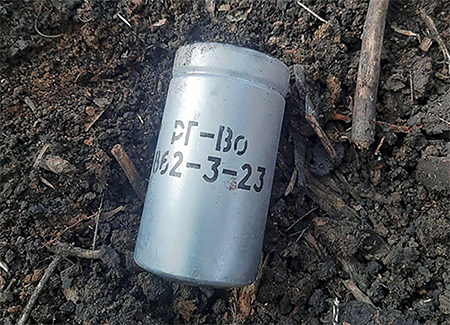"I greatly appreciate your very swift response, and your organization's work in general. It's a terrific source of authoritative information."
OPCW Finds More Chemical Weapons Use in Ukraine
April 2025
By Mina Rozei
The Organisation for the Prohibition of Chemical Weapons (OPCW) has found more evidence of chemical weapons use in Ukraine, it said in a Feb. 14 report.

The findings came after Ukraine requested that the OPCW investigate three separate incidents in October 2024 when toxic chemicals were allegedly used along the confrontation lines between Russian and Ukrainian forces in the Dnipropetrovsk region.
The OPCW deployed its technical assistance visit team on two missions to Ukraine to collect documents, digital files, witness testimonies, and environmental samples. These samples were analyzed independently by laboratories that are part of the OPCW network, and the organization confirmed that the chain of custody was maintained throughout the analysis process.
The laboratory analyses revealed the presence of 2-Chlorobenzylidenemalononitrile (CS), in all three alleged instances. CS is a riot control agent, which when used in a conflict setting constitutes a violation of the Chemical Weapons Convention. OPCW Director-General Fernando Arias said the CS was used in riot-control-agent grenades.
The report did not identify who was responsible for using CS on the battlefield. The OPCW Technical Secretariat circulated a note at the most recent Executive Council meeting stating that “the mandate of the secretariat under this [technical assistance visit] request was never to look at where the grenades came from but to determine whether they were indeed found along the frontlines.”
This is not the first time that CS has been found on the battlefield in Ukraine. The OPCW confirmed the presence of the CS agent in November after its first technical assistance visit to Ukraine in July. (See ACT, December 2024.)
The findings were published several weeks before the most recent meeting of the OPCW Executive Council. At the meeting, held March 4-7 in The Hague, the Russian delegation circulated a diplomatic note criticizing the report for containing “discrepancies” and casting doubt on the integrity of the chain of custody. The delegation also circulated a document Feb. 28, before the council meeting, in which it accused Ukraine of using toxic chemicals as weapons against Russian military and civilians.
The Ukrainian delegation exercised its right of reply at the council meeting by issuing a statement in which it rejected the Russian allegations as “disinformation,” and said Russia “continues to use riot control agents against Ukrainian troops.” At the meeting, the OPCW Technical Secretariat responded to Russia’s accusations by saying that “the secretariat works impartially for the 193 states-parties to the convention, including the Russian Federation.”
